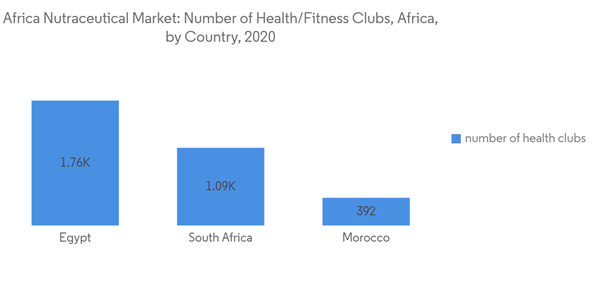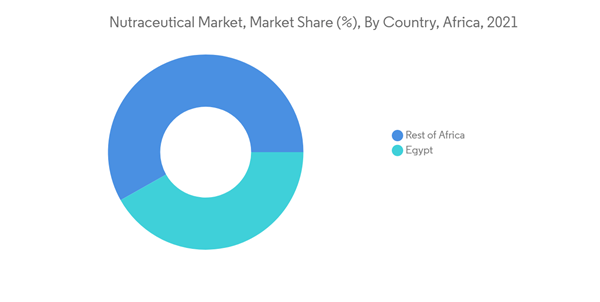International health organizations, such as WHO, are encouraging consumers to strengthen their immune systems to prevent COVID-19. Various nutraceuticals are more popular for their immunity-boosting properties. Since vitamin C, zinc, and vitamin E are popular ingredients known for enhancing immunity, leading manufacturers are increasingly incorporating them into food, beverages, and supplements to tap into the market. The health trend has recently gained more momentum, giving rise to the entry of global players into the market. For instance, in 2020, Royal DSM, a leading science company in nutrition, the United Nations children's rights agency, United Nations Children's Fund (UNICEF), and Swiss-based nutrition think tank, Sight and Life, announced the extension of their cross-sector partnership, focusing on delivering better nutrition to at-risk children and mothers in South Africa until the end of 2021. The COVID-19 crisis is likely to accelerate trends that were already shaping the market, such as the rise of the middle class and the use of e-commerce.
The infant nutrition industry's growth and the demand for healthy and nutritious food and beverages are driving the nutraceutical market in Africa. Market accessibility and low economic conditions in the region restrain this market. Moreover, Egypt and South Africa are trying to adopt more plant-based nutraceuticals, which is a great opportunity in the African market.
The increasing incidence of non-communicable diseases and rising medical expenses, and an obligation to fortify foods by government agencies in the region, have been pushing the demand for nutraceuticals. Lifestyle changes and increased consumption of packaged foods are the major reasons for the increased prevalence of lifestyle-related diseases, such as cardiovascular diseases and diabetics, which is further boosting the demand for alternative healthy foods like functional foods in the region.
Africa Neutraceutical Market Trends
Emerging Trends for Health and Wellness
The shifting consumer trends are also encouraging nutraceutical manufacturers to develop new products to meet consumer preferences. With the growing inclination toward physical fitness, several health clubs and fitness centers have come up recently. The growth of these establishments is one of the factors that may drive the nutraceutical market during the forecast period. Africa has one of the fastest-growing obesity rates globally, largely due to a growing urbanized population having desk jobs and Western-influenced food choices. The number of diabetic patients in Africa is expected to rise from 12.1 million to 24 million by 2030. The African Development Bank predicts that chronic conditions, such as hypertension, obesity, and cancer, will account for nearly half of the deaths within a decade. This factor resulted in a significant increase in the number of Africans joining fitness clubs.South Africa Leads the Overall Market
The South African nutraceuticals market is primarily driven by changing consumer lifestyles and preferences. Due to the rising prevalence of non-communicable chronic diseases and increasing health awareness associated with the consumption of functional foods, consumers are including nutraceuticals in their regular diet, thus boosting the sales of nutraceuticals. The rising demand for preventive healthcare is one of the major factors driving the nutraceuticals market. Nutraceuticals contain antioxidants, probiotics, and polyunsaturated fatty acids, which help manage health issues like obesity, cancer, cholesterol, arthritis, and diabetes. The nutraceutical market is lifestyle-driven. The increasing concerns about physical health and leading a healthy lifestyle are driving the nutraceutical market. The increasing fitness trend is catching up with other regions and driving sales of nutraceuticals. The surging demand for natural sweeteners is also expected to drive the growth of the African nutraceutical market. Sweeteners contain no or low-calorie content. Thus, they are used in producing sports and energy drinks by manufacturers in the regional market.Africa Neutraceutical Industry Overview
The key multinational companies active in the region hold the major share of the market. Product innovations, technological advancements, partnerships, mergers, acquisitions, market expansions, and category expansions are the important strategies followed by market leaders. Some of the major players in the African nutraceutical market are Arla Foods, Nestle, Herbalife International of America Inc., Amway, and The Kellogg Company.Suppliers are less in terms of ingredients, as most of the market is controlled by domestic suppliers in the region. Furthermore, the availability of trending ingredients in terms of consumer perspective and ingredients that align with regulations can only be sourced by specific market players.The increasing health awareness and labeling requirements have made the companies look for specific suppliers that provide quality raw materials.
Additional Benefits:
- The market estimate (ME) sheet in Excel format
- 3 months of analyst support
This product will be delivered within 2 business days.
Table of Contents
Companies Mentioned (Partial List)
A selection of companies mentioned in this report includes, but is not limited to:
- Arla Foods
- Nestle SA
- Herbalife International of America Inc.
- Amway International
- Kellogg Co.
- RedBull Corporation
- Danone
- Real Foods Group
- GlaxoSmithKline PLC
- The Coca-Cola Company










